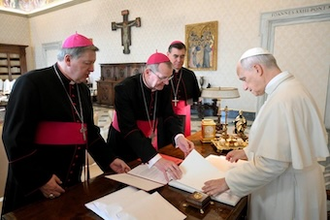Study suggests new laws have led to decline in religious discrimination

Dr Paul Weller
Research into religious discrimination in England and Wales since the first law barring it - the 2003 Employment Equality (Religion or Belief) Regulations - has been published.
The report - Religion and Belief, Discrimination and Equality in England and Wales: A Decade of Continuity and Change - was led by Paul Weller, Professor of Inter-Religious Relations at the University of Derby, working with Oxford and Manchester universities.
It builds on Professor Weller's research for the Home Office in 1999-2001, and other work, and covers the decade following the 2003 law change; making it illegal in England and Wales to specifically discriminate on the grounds of religion or belief, regarding employment and vocational training. This was followed by the broader 2006 Incitement to Racial and Racial Hatred Act, and the 2006 and 2010 Equalities Acts.
The project's summary findings include:
* indications that changes in the law have contributed to a reduction in the reported experience of unfair treatment on the basis of religion or belief, BUT that 'substantial' levels of such reports continue to affect important areas of people's lives;
* unfair treatment is generally reported to be more to do with individuals' attitudes and behaviours (including in employment situations) than with organisations' policies and practices;
* Muslim, Pagan and New Religious Movement organisations continue to report higher levels of unfair treatment than others. Jewish organisations continue to report anti-semitism, stereotyping and targeted attacks on Jewish property;
* reported unfair treatment of female Muslims, and people of other faiths being perceived as Muslims, due to the wearing of head coverings;
* Christians citing unfair treatment around wearing crosses, reporting pressure to work Sundays by employers and a sense of their religion being marginalised whilst other faiths received fairer treatment;
* a sense from non-religious individuals that Christianity's being 'structurally embedded' in British society led to preferential treatment for people of that faith, especially in matters of education and governance.
The two year project's findings are based on responses from almost 500 religious organisations, and interview and focus group discussions with 270 people, of various faiths and none.
Participants included religious organisations in England and Wales; fieldwork interviews with a range of people in Cardiff, Blackburn, Leicester, Newham, and Norwich; and focus groups held in those same areas with those understanding themselves to be 'non-religious'; and a systematic review and analysis of legal cases and of previous research. Five Knowledge Exchange Workshops were also held in Cardiff, Derby, London, Manchester and Oxford with practitioners in the public, private, legal, voluntary and community, and religion and belief sectors.
The project found respondents saw public education as the primary way forward in
tackling unfair treatment.
Gearing UK social policy towards an idea of 'Britishness' was seen as less helpful by people in fostering understanding than an emphasis on citizenship, equal opportunities, greater working between and cohesion of communities, and an appreciation of the benefits of multiculturalism.
The project was financially supported within the Religion and Society Research Programme, funded by the Arts and Humanities Research Council (AHRC) and the Economic and Social Research Council (ESRC).
Paul Weller, Professor of Inter-Religious Relations at the University of Derby, said: "A decade ago in domestic law it was not illegal in England and Wales to discriminate on grounds of religion or belief, so at that time those who reported unfair treatment on the basis of religion or belief had little scope for remedy.
"Since then we have had the 2003 Employment Equality (Religion or Belief) Regulations, Incitement to Racial and Racial Hatred Act, 2006, and the 2006 and 2010 Equalities Acts.
"Although unfair treatment on the basis of religion or belief continues, evidence from our field research suggests that, particularly in the public sector, these legal changes have contributed to policy development and institutional change, resulting in some improvements in both inclusive consultation and practice."
A Summary Findings document and Policy Brief for the project are now available, together with further background information, on its website www.derby.ac.uk/religion-and-society.
Information on the project's broader outputs and its public engagement can accessed from the Research Councils' Gateway to Research at http://gtr.rcuk.ac.uk















